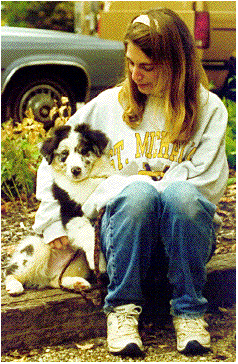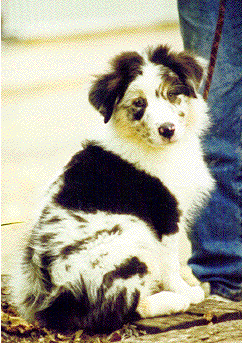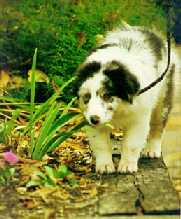|
Some of my
dogs
Clicker
Training
Propwash
Dogs
Information
on Buying a Dog
Awards
Dog
Links
Some of my
dogs
Clicker
Training
Propwash
Dogs
Information
on Buying a Dog
Awards
Dog
Links
Some of my
dogs
Clicker
Training
Propwash
Dogs
Information
on Buying a Dog
Awards
Dog
Links

Some of my
dogs
Clicker
Training
Propwash
Dogs
Information
on Buying a Dog
Awards
Dog
Links

Some of my
dogs
Clicker
Training
Propwash
Dogs
Information
on Buying a Dog
Awards
Dog
Links

|
|
|


You, and maybe your
family, have decided that it is time to get a dog.
And the dog you want is an aussie. The following
are some questions frequently NOT asked and
answered by people thinking about getting their new
aussie. Hopefully, by asking these questions, you
will be happy with whatever type of puppy or adult
dog you decide to bring home.
 Why
do I want a puppy? Puppies are a lot of work.
They chew, they go to the bathroom in the house,
they whine at 3:00 in the morning before your big
meeting, they don't know what "sit", "lie down", or
"come" mean, and they constantly need SOMETHING. If
you don't have the time to meet the needs of a
puppy, why not consider an older dog? While
watching a puppy grow up is fun; it is also time
consuming. Many breeders, for a variety of reasons,
will have older dogs for sale. Rescue also has
older dogs available. These dogs will love you.
They do bond with you just like a puppy would. And
they are a lot less likely to chew, whine, .... Why
do I want a puppy? Puppies are a lot of work.
They chew, they go to the bathroom in the house,
they whine at 3:00 in the morning before your big
meeting, they don't know what "sit", "lie down", or
"come" mean, and they constantly need SOMETHING. If
you don't have the time to meet the needs of a
puppy, why not consider an older dog? While
watching a puppy grow up is fun; it is also time
consuming. Many breeders, for a variety of reasons,
will have older dogs for sale. Rescue also has
older dogs available. These dogs will love you.
They do bond with you just like a puppy would. And
they are a lot less likely to chew, whine, ....
Why do I want a dog? We all know the
wonderful things that dogs can do for us. They give
us unconditional love. They help us to live longer.
They remind us of our childhood. However, they are
also a life long commitment. Dogs can live up to 17
years or more. They require yearly shots and
heartworm medication. They will have accidents,
just like people. This all costs money. Dogs also
require food, buckets, food dishes, dog beds.....
and exercise. They need people to spend time with
them playing, training, working, interacting. If
you can't afford the time, money, and commitment
the dog requires, maybe it's not your time to get a
dog.
Why should I not get a dog from the pet store?
They look so cute and it sure is convenient.
Dogs are not a commodity to be bought and sold
on a whim. They are living animals and require
time, money, and commitment from the whole family,
(see previous question). They should not be bought
impulsively. In addition to this, pet stores buy
their puppies from "breeders" who may or may not
keep their dogs in what most people would consider
appropriate conditions. The parents often are not
screened for genetic defects. So you do not know
what problems you are getting and you are
perpetuating the abuse of the dogs kept in these
puppy mills. No matter how cute the puppies are, DO
NOT BUY ONE.
OK, so who should I buy a dog from? This is
a hard question with no easy answer. Here are some
thoughts to guide you in the right direction. Learn
about the breed you are thinking about acquiring.
Visit shows. Subscribe to the national magazine.
Join the local breed club. Talk to people. Listen
more than you talk. See whose dogs are well behaved
in and out of the ring. See whose dogs appear happy
and well cared for. Surfing the web may be one way
to make contacts, but it cannot take the place of
time and energy put into meeting and observing
actual breeders and their dogs. In some areas of
the country there will be more people and more dog
shows than in other parts. But with time,
persistence and a willingness to travel, you will
meet people.
So what should I ask the breeder of my future
puppy/adult dog?  In many books there are lists of questions you
should ask the breeder of your puppy. I feel these
lists are misleading. No set of questions will tell
you if a breeder is good or not. The "bad" breeders
will have "good" answers to these questions. The
"good" breeders will often not have answers to
them. One question I have seen in several lists
goes something like this: ask the breeder why
he/she did this breeding. How is someone who has
been actively involved with a breed for 10, 20, or
30 years going to answer that question to a novice?
Breeding is a science, but it is also an art. You
can study pedigrees all you want, but the best
breedings are often done based on years of
observation and intuition. How can you explain to
someone in ten minutes what you have spent a
lifetime learning? However, for a new breeder this
could be an easy question, and they will tell you
all the reasons the sire's pedigree compliments the
dam's. This does not make one breeder better or
worse than another.
In many books there are lists of questions you
should ask the breeder of your puppy. I feel these
lists are misleading. No set of questions will tell
you if a breeder is good or not. The "bad" breeders
will have "good" answers to these questions. The
"good" breeders will often not have answers to
them. One question I have seen in several lists
goes something like this: ask the breeder why
he/she did this breeding. How is someone who has
been actively involved with a breed for 10, 20, or
30 years going to answer that question to a novice?
Breeding is a science, but it is also an art. You
can study pedigrees all you want, but the best
breedings are often done based on years of
observation and intuition. How can you explain to
someone in ten minutes what you have spent a
lifetime learning? However, for a new breeder this
could be an easy question, and they will tell you
all the reasons the sire's pedigree compliments the
dam's. This does not make one breeder better or
worse than another.
OK, what about a few broad guidelines?
Well, both parents should have OFA ratings, of
which you should be able to see proof. Also, both
parents' eyes should have been certified free of
eye defects within the past year by a veterinary
ophthalmologist, (not the local vet). You should be
able to meet at least one of the parents and feel
comfortable with his/her temperament. Please
remember that the dam could be feeling a little
protective of her puppies if they are young. This
is normal. The kennel setup should appear clean and
neat. The dogs should appear happy and healthy. I
would like to emphasize that the kennel needs to be
clean, but the dogs may be dirty if they have been
out working, running, or swimming in the local mud
hole. Most importantly, you should feel comfortable
with the breeder. You should have seen her/him
before and have met and talked to people who have
bought dogs from him/her and were happy. Please
realize that the dog show world can be very
political, so just because one person had a bad
experience, don't write the breeder off. But if a
pattern emerges, then become concerned.
So what are the problems with owning an
Aussie? An aussie is not a dog for everyone.
Hopefully with all your research, you realize that.
An aussie needs to have a job. They enjoy being
with you and doing activities with you. This means
they will require a lot of your time. Aussies must
have exercise, although mental stimulation is more
important than an overabundance of exercise.
Aussies may be good with children, but like all
dogs, they require supervision and training so they
act properly around the younger family members.
Aussies are very reactive to new people, places,
and situations. To help them, and yourself, deal
with this reactivity management and training are
vital.
How much should I
expect to pay for my Aussie? This depends on
what you are looking for in an aussie and where you
live. Prices vary from one part of the country to
another. Most rescue organizations require a
donation of $150-$250 to help off set expenses.
Puppies from a reputable breeder will range from
around $400-$900 for a puppy that must be spayed or
neutered. For a puppy that may be  bred
expect to pay move and have "strings" attached. A
reputable breeder is not going to want their puppy
to be bred if it does not grow up to fit the breed
standard, and if the owner is not responsible.
Therefore, they may wish to co-own the puppy with
you until it is mature and/or until you have put
some titles on the dog to show your commitment to
the dog and the breed. For an adult dog, the amount
of training already on the dog and the reason you
are buying the dog will greatly affect the price. A
stock dog that is already trained can range from
$800 or $1000 on up, depending on the amount of
training it has. If you will be breeding the dog
the price, again, can range form $800 on up. But if
the dog is going to be a family pet, many breeders
will place a dog with you for a nominal fee, or for
a litter back before the bitch is spayed. In these
situations the breeder is often looking for a good
home for a dog that did not turn out to be exactly
what they wanted but there is nothing to prevent
the dog from being an excellent family
companion. bred
expect to pay move and have "strings" attached. A
reputable breeder is not going to want their puppy
to be bred if it does not grow up to fit the breed
standard, and if the owner is not responsible.
Therefore, they may wish to co-own the puppy with
you until it is mature and/or until you have put
some titles on the dog to show your commitment to
the dog and the breed. For an adult dog, the amount
of training already on the dog and the reason you
are buying the dog will greatly affect the price. A
stock dog that is already trained can range from
$800 or $1000 on up, depending on the amount of
training it has. If you will be breeding the dog
the price, again, can range form $800 on up. But if
the dog is going to be a family pet, many breeders
will place a dog with you for a nominal fee, or for
a litter back before the bitch is spayed. In these
situations the breeder is often looking for a good
home for a dog that did not turn out to be exactly
what they wanted but there is nothing to prevent
the dog from being an excellent family
companion.
What should I expect
from a breeder when I get ready to buy my puppy?
All reputable breeders have a contract that
they will expect you to sign. These contracts will
vary from one person to another but here is a list
of things I would expect to find in any contract
for a family pet: stipulations on when the puppy
should be spayed or neutered, if you ever choose to
get rid of the puppy the breeder has the right for
first refusal if you sell the dog and that the dog
has to go back to the breeder instead of being
turned into the pound or a rescue organization, and
the puppy will be guaranteed free from hereditary
defects. Contracts involving dogs that are not sold
on a spay/neuter contracts will typically have more
requirements spelled out in them, including
breeding privileges and titles you may be required
to put on the dog before you own the dog outright.
You should also expect that the breeder checks you
out as thoroughly as you are checking them out.
After all, they want to be sure their puppies are
going to a good home. And the breeder should be
there for you when you have questions about your
new puppy or dog. This is an ongoing relationship,
not one that ends with the signing of a
check.
Now that I have my
Aussie, what should I do? Enroll in a good
obedience class, no matter what the age of your
dog. It will only help to increase your bond with
the dog. For some training advice check out my
training
section. And have fun with your dog, that is why
you bought it after all :)

|
This
page was created by and is copyrighted to
Beth
MacLehose.
If you notice any graphics I have used
that are yours and you would prefer I not
use them let me know and I will remove
them. Also all pictures and text is
copyrighted to me or the cited author.
Please email the author for permission to
use material you find here.
|
|
|